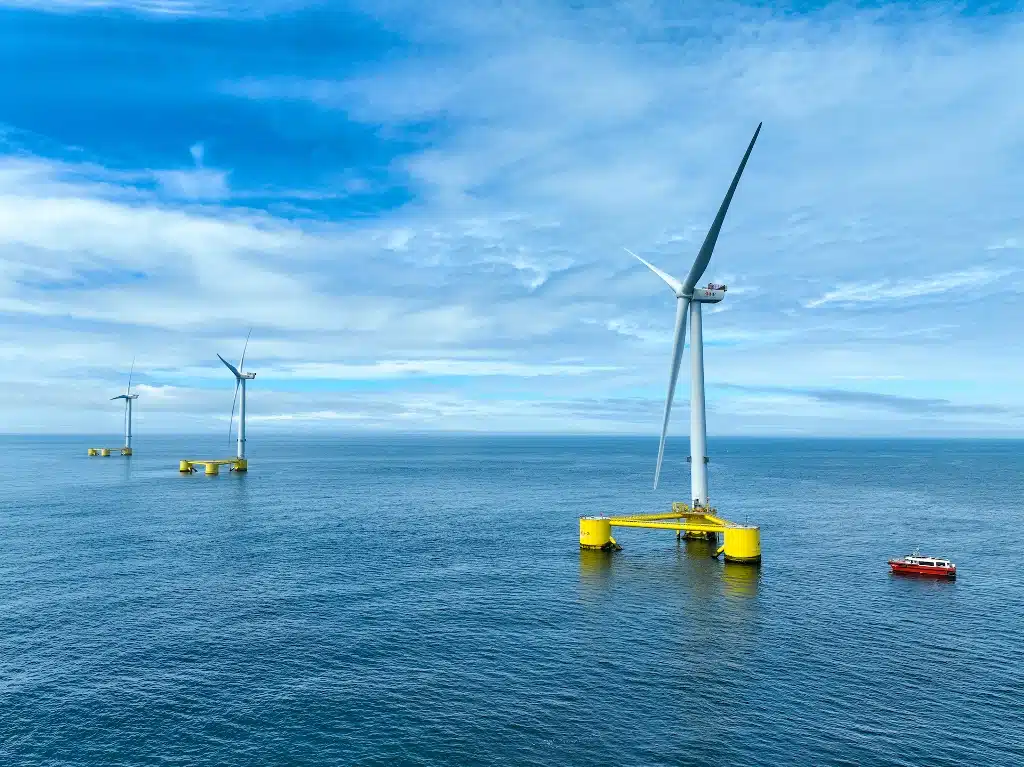Iberia will strengthen its case as a world-leading hub for floating offshore wind as energy sector heavyweights descend on the Portuguese capital to direct the region’s future roadmap.
Leaders from the energy sector, academia and political sphere will unite at the ‘Offshore Wind in Iberia: Innovation & Perspectives Conference’ on November 10, at Museu do Oriente, in Lisbon, Portugal. Click here to register and discover more.
Organised by WavEC Offshore Renewables, in collaboration with the Embassy of Spain in Portugal, keynotes will be delivered by Portugal’s Secretary of State for Maritime Affairs José Maria Costa and Spain’s Ambassador to Portugal Marta Betanzos Roig, with a video address from Secretary of State for Energy João Galamba.
Energy firms and developers, Iberblue Wind, Ocean Winds, Baywa, Acciona, Capital Energy, Orsted, Corpower Ocean, Principle Power, X1 Wind, SAITEC, EnerOcean and TechnipFMC will join research leaders from TECNALIA, INESCTEC, PLOCAN, Centro Nacional del Hidrógeneo in a series of panel discussions. Spain’s Institute for Diversification and Saving of Energy (IDAE), Portugal’s Directorate General for Energy and Geology (DGEG) and EIT InnoEnergy provide further input, as well as other supply chain actors including Endiprev and Navantia. Event moderators include the Portuguese Association of Renewable Energy (APREN), WAM Investments, Companhia de Energia Oceânica (CEO) and law company GAP – Gómez-Acebo & Pombo Abogados
Huge opportunities lie in the rapidly emerging floating wind market, with the world’s largest wind industry body – The Global Wind Energy Council – predicting more than 16GW of floating turbines to be deployed by 2030.
In Iberia alone, experts suggest the sector could create circa 50,000 highly qualified jobs in the next two decades, generating €5,000million annually by 2030, with one third coming via exports.
WavEC President António Sarmento said the conference comes at a pivotal moment, at the dawn of the floating wind era. “We are inviting industry leaders to help shape this exciting new industry which could position Iberia at the centre of the global energy transition and redefine national ambitions for generations to come,” he said. “We also share the ability to quickly develop domestic markets at early stages, including through island areas. Both nations are now ramping up the test and development of innovative technologies to quickly establish business models and competitive industries, as well as the first auctions for offshore wind. We look forward to discussing flagship projects underway and the region’s role more broadly as a world-leading hub for technology development and industrial leadership in floating offshore wind.”
The conference also serves as the final event for the European Horizon 2020 TWIND Project (see notes to editors.) developed to create a ‘network of excellence’ to thrust Portugal’s offshore wind ambitions.
Portugal plans to install 10 GW of offshore wind capacity by 2030, with around 90% of the nation’s total 131 GW offshore wind potential dependent on floating foundations. Meanwhile, Spain recently approved its first Offshore Wind Roadmap with plans to install 3 GW by 2030, all likely to be floating structures. Already recognised as a European leader for onshore wind, Spain has 27 GW of installed capacity, contributing more than €3bn to national GDP and providing more than 27,500 jobs. Ports and shipyards across Spain currently play a key supply chain role for offshore wind across Europe.
Carmen María Roa Tortosa from Instituto para la Diversificación y Ahorro de la Energía (IDAE Institute for Diversification and Saving of Energy) said: “The use of marine renewable energies in new future facilities that diversify the energy mix with energy sources of non-fossil origin, will contribute to achieving energy, climate, environmental and industrial objectives/targets, and will mean a significant reduction in the level of CO2 emissions favouring the transition to a low-carbon economy at a global level. During this complicated geopolitical era, plagued by energy and economic uncertainty, the floating offshore wind sector presents a unique opportunity to harness proprietary renewable resources, bringing greater stability to our electrical system.
“In terms of specific regions of the Iberian Peninsula, pending the approval of the maritime spatial plan, and based on the areas identified for the development of offshore wind, there is great potential for development in the Cantabrian Sea and off the coast of Andalusia, where offshore wind power could provide an economic engine for the region. In addition, Galicia, combined with the northern and central regions of the Atlantic coast of Portugal, offers excellent offshore wind energy resources that could eventually give rise to bilateral working groups between Spain and Portugal at the level of coordinated development of commercial offshore wind projects.”
WavEC is a world-renowned ‘centre of excellence’ focusing on the development of marine renewable energy through R&D, knowledge transfer and innovation. The non-profit organisation heavily supports the EU’s Horizon Europe Programme and has delivered more than 70 R&D projects in the marine renewables sector. It has worked in collaboration with more than 350 partners in 32 countries. A co-founder of the OceanACT consortium, WavEC also co-manages the Aguçadoura test site in north Portugal, promoting offshore testing infrastructures to support blue economy technologies.
For more information on WavEC visit www.wavec.org email mail@wavec.org or telephone: +351 21 8482655












